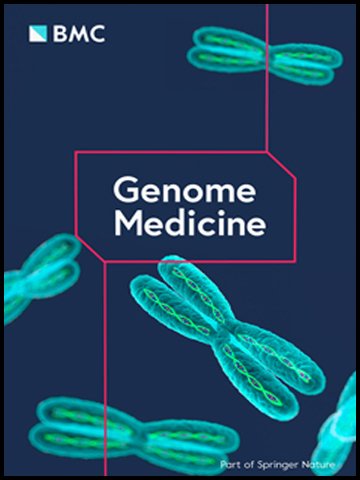结合光学基因组图谱和 RNA-seq 技术检测和解释未解决的神经发育障碍中的结构变异
IF 10.4
1区 生物学
Q1 GENETICS & HEREDITY
引用次数: 0
摘要
结构变异(SVs)是导致神经发育障碍(NDDs)的主要遗传因素。外显子组测序(ES)是目前 NDDs 基因检测的一线工具,但在 SVs 检测方面存在不足。光学基因组图谱(OGM)等新方法正在积极填补这一诊断空白。本研究评估了结合 OGM 和 RNA-seq 检测和解释 ES 阴性 NDD 中 SVs 的实用性。对 43 例 ES 结果不确定的 NDD 患者进行了 OGM。根据疾病关联性和致病性评估筛选出候选 SVs,并通过其他方法进一步验证或重建 SVs,包括针对复杂重排事件的长读程测序。对候选 SV 患者的血液样本进行了 RNA-Seq,以帮助解释致病性。OGM 检测出了四个候选 SV,RNA-seq 则证实了患者群中三个 SV 的致病性。这种联合方法解决了三个病例--两个病例的基因中存在与常染色体显性 NDD 相关的新 SV,包括一个包含 MBD5 启动子和 5′UTR 的缺失以及 PAFAH1B1 的基因内重复;第三个病例的基因内重复与 PLA2G6 的一个致病性单核苷酸变体反式,与常染色体隐性 NDD 相关。受影响基因的表达改变和两个基因内重复基因的串联定位已通过 RNA-seq 得到证实。在第四个病例中,OGM 检测到涉及 2 号和 6 号染色体的复杂重排,比传统细胞遗传学分析所显示的新 t(2:6)(q13;q15)复杂得多。重构显示,跨度为9.3 Mb的6q15的17个片段发生了错乱,并与2q11.2相连,在NDD相关基因SYNCRIP的5′和3′非编码区检测到4个断点。RNA-seq显示SYNCRIP的表达基本保持不变,因此这一复杂重排事件的致病性尚不确定。通过 OGM 可以鉴定 ES 阴性 NDD 中的 SV,这对于 ES 未覆盖的非编码区 SV 尤为有用。OGM 有助于构建复杂的 SV,并提供有关重复位置和方向的信息,这对致病性解释至关重要。RNA-seq的整合有助于在转录水平解释SV的功能性后果。这些研究结果证明了在 ES 阴性 NDD 病例中结合 OGM 和 RNA-seq 的实用性和可行性。本文章由计算机程序翻译,如有差异,请以英文原文为准。
Combining optical genome mapping and RNA-seq for structural variants detection and interpretation in unsolved neurodevelopmental disorders
Structural variations (SVs) are key genetic contributors to neurodevelopmental disorders (NDDs). Exome sequencing (ES), the current first-line tool for genetic testing of NDDs, falls short in SVs detection. This diagnostic gap is being actively addressed by new methods such as optical genome mapping (OGM). This study evaluated the utility of combining OGM and RNA-seq in the detection and interpretation of SVs in ES-negative NDDs. OGM was performed in 43 patients with NDDs with inconclusive ES results. Candidate SVs were selected based on disease association and pathogenicity evaluation, and further validated or reconstructed by alternative methods, including long-read sequencing for a complex rearrangement event. RNA-Seq was performed on blood samples from patients with candidate SVs to facilitate interpretation of pathogenicity. OGM detected four candidate SVs, and RNA-seq confirmed the pathogenicity of three SVs in the patient cohort. This combined approach solved three cases—two cases with de novo SVs in genes associated with autosomal dominant NDDs, including a deletion encompassing the promoter and 5′UTR of MBD5 and an intragenic duplication of PAFAH1B1, and a third case possessing an intragenic duplication in trans with a pathogenic single-nucleotide variant of PLA2G6, associated with autosomal recessive NDDs. The expression alteration of the affected genes and the tandem positioning of two intragenic duplications were confirmed by RNA-seq. In the fourth case, OGM detected a complex rearrangement involving chromosomes 2 and 6, much more complex than the de novo t(2:6)(q13;q15) indicated by conventional cytogenetic analysis. Reconstruction showed that 17 segments of 6q15 spanning 9.3 Mb were disarranged and joined 2q11.2, with four breakpoints detected in the 5′ and 3′ non-coding region of the NDD-associated gene SYNCRIP. RNA-seq revealed largely preserved SYNCRIP expression, leaving the pathogenicity of this complex rearrangement event uncertain. SVs in ES-negative NDDs can be identified by OGM, which is particularly useful for SVs in non-coding regions not covered by ES. OGM helps to construct complex SVs and provides information on the location and orientation of duplications, which is crucial for pathogenicity interpretation. The integration of RNA-seq facilitates the interpretation of the functional consequences of SVs at the transcriptional level. These findings demonstrate the utility and feasibility of combining OGM and RNA-seq in ES-negative cases with NDDs.
求助全文
通过发布文献求助,成功后即可免费获取论文全文。
去求助
来源期刊

Genome Medicine
GENETICS & HEREDITY-
CiteScore
20.80
自引率
0.80%
发文量
128
审稿时长
6-12 weeks
期刊介绍:
Genome Medicine is an open access journal that publishes outstanding research applying genetics, genomics, and multi-omics to understand, diagnose, and treat disease. Bridging basic science and clinical research, it covers areas such as cancer genomics, immuno-oncology, immunogenomics, infectious disease, microbiome, neurogenomics, systems medicine, clinical genomics, gene therapies, precision medicine, and clinical trials. The journal publishes original research, methods, software, and reviews to serve authors and promote broad interest and importance in the field.
 求助内容:
求助内容: 应助结果提醒方式:
应助结果提醒方式:


